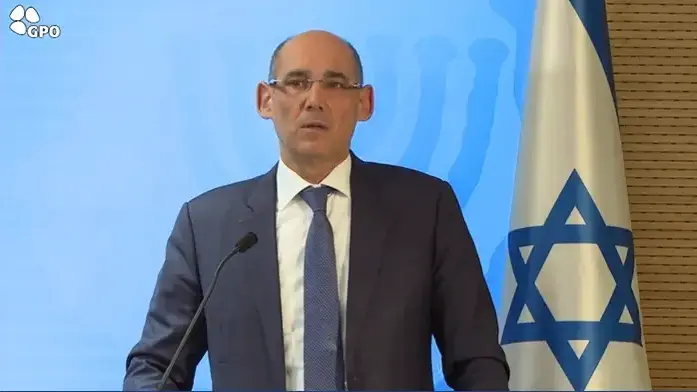The Chief of Staff and the Prime Minister. Their statements, each in its own sector, hastened the weakening of the shekel (Photo: Government Press Office, Haim Tzach)
There was an appreciation and we are no more.
Until 2002, Israel had a chronic current account deficit, meaning less foreign currency than current needs, which led to the depreciation of the shekel.
The sad result was, through the transmission mechanism, very high inflation, which disrupted life in Israel: erosion of workers' wages, strikes, losses of millions of work hours to the economy, weakness of the economy, low standard of living – everything that led to very strong or very weak strata preferring to emigrate, "descending" in the language of the people or "falling of freckles" in the language of former Prime Minister Yitzhak Rabin in 1976.
The peak of the deficit was in 1995, Israel had a current account deficit of 5% of GDP, in comparison, in 2002 the deficit was 0.9% of GDP. A sharp change in economic policy during Ariel Sharon's government in 2003, when Benjamin Netanyahu served as Minister of Finance, brought about a substantial change in this trend.
Since 2003, Israel has had a current account surplus, economic stability generally, almost no strikes, and the economy is functioning. The standard of living has risen dramatically. Instead of traveling abroad once every four years, Israelis travel four times a year. Paradise, despite rounds of war against Arab organizations seeking to erase Israel, life generally benefits Israelis and the increasing waves of immigration. The descent from Israel of the "freckles" was cut by two-thirds, while the number of residents almost tripled.
Prime Minister Yitzhak Rabin (pictured with Uri Zohar, during his first term) coined the phrase "a fall of freckles" (Photo: National Photo Collection, Yaakov Saar)
Current Account
A very important figure for the strength of any economy, naturally also of the Israeli economy, is the "current account". This account includes Israel's trade in goods and services abroad, i.e. exporting and importing goods and services, exporting goods for example, pharmaceuticals or potash, or exporting research and development services for companies abroad. On the contrary, when importing, such as importing vehicles or importing insurance services, everything is adjusted to the settings of the balance of payments.
Receipts and payments with countries around the world are also counted. They derive from income from factors of production, such as income and expenses for wages, wages that Israelis received abroad for their work substantially, as opposed to wages that the Israeli economy pays to foreigners residing and working in Israel, such as Palestinians or caretakers from abroad.
Including the current account, income and payments from abroad for investments Israelis made abroad, such as interest from bonds purchased abroad or dividends from shares abroad in which Israelis invested, And vice versa – the payments of the Israeli economy abroad in those categories mentioned above. Also included in the current account are transfers from Israel to abroad (and vice versa) of assets or receipts without a defined payment for them at the same time, such as donations by Israelis abroad (including funding for studies abroad), or donations by Americans to hospitals in Israel. Also heavy receipts from the Israeli government from the US administration or compensation receipts to Israeli residents, such as from Germany.
It took several years for investors around the world and in Israel to assimilate the significance of the surplus into Israel's current account. Even the governments of Israel and the Bank of Israel have not implemented the sharp positive change that has continued for years and to this day. In recent years, the current account surplus has reached almost 5 percent of GDP. In absolute terms, according to quarters, the boom in Israel's high-tech industry led to a record current account surplus of $7.54 billion in the last quarter of 2021, compared with $2.88 billion in the last quarter of 2019, prior to COVID-2021.
In all of 23, the surplus was at a record rate of $43.2022 billion, and in 26 it even rose to $24.2022 billion. We note that in the last quarter reported for 5, the current account surplus has already fallen to $28.6 billion, after $63.2022 billion in the third quarter of 2022. Israeli high-tech began to weaken in the second quarter of 2022 due to the global high-tech crisis that began in the second quarter of 2019.
The compensation to the Israeli economy was not long in coming, tourism traffic to Israel began to flourish almost to <> levels, defense exports soared mainly due to the assimilation of risks to countries in Europe and Southeast Asia due to the Russian invasion of Ukraine, ensuring that the current account surplus remains at a high level.
More in Walla!
The device that revolutionizes wrinkle fighting - on sale
In association with B-Cure Laser
High-tech protest in Herzliya Pituach. On the one hand, the industry that pulled the economy up. On the other hand, the one most identified with the demonstrations (Photo: official website, high-tech protest)
The resumption of investment traffic in the coming year also bodes well, mainly due to the wave of investments in the artificial intelligence industry. The first swallow is Nvidia, which is building in Israel one of the most powerful computers in the world based on the company's new artificial intelligence training platform, AI. NVIDIA's value is approaching $1 trillion.
The current account surplus led to a decline in the inflation rate beyond expectations. The appreciation of the real shekel, that is, the strengthening of the shekel against Israel's basket of currencies, reached 29.2 percent over fifteen years between 2006 and the end of 2021. In addition, the shekel strengthened by nearly 30 percent, forcing mainly export sectors to become more efficient and increase labor productivity, and from there labor productivity began to trickle down to industry and services of a domestic nature.
This means that in shekel terms, imports have been significantly reduced, a reverse movement to currency depreciation. The result is that the average rate of increase in the Consumer Price Index over the fifteen-year period was 1.43% per year, far below the government's midterm target of 2%, still within the range set by the Israeli government, between 1% and 3%.
This stability was achieved mainly due to the high-tech industry and economic reforms, but also from demographic changes, such as the integration of diligent immigration with the invaluable baggage of knowledge and education from the countries of the former Soviet Union, which brought stability and growth for half a generation.
President of the Supreme Court between the Minister of Justice and the Chairman of the Constitutional Committee. The desire to promote snap legislation in a crude motion is among the causes of the crisis (Photo: Image processing, Shlomi Gabay, Reuven Castro, Danny Shem Tov – Knesset Spokesperson)
The Causes of the Crisis: Reform and Protest
The high-tech crisis that has erupted around the world, regardless of Israel, mainly due to the incessant interest rate increases by the US Federal Reserve, is causing a decline in Israel's current account surplus.
If that wasn't enough, the current government came along and tried in a crude movement, some of it certainly just, such as on the issue of changing the structure of the Judicial Appointments Committee, to change the legal world order with a sickle cell movement. The demonstrations organized by opposition elements, including frustrated figures who held key positions in the past, including empty vessels, have shocked Israel's economic system.
The demonstrations became heavier and worse than necessary. The result was a real depreciation, with an emphasis on real ones, in the value of the Israeli shekel. Israel's currency basket became more expensive from the end of December 2021 to the end of April of this year by 13.3 percent, most of the real fall in the value of the shekel was in the first third of the year, 2023. Israel's real currency basket, against which the shekel is traded on international markets, increased by 6.9 percent! Within four months.
The result was not long in coming: the Consumer Price Index rose by 2% in just four months!, an annual rate of over 6%, compared with an increase in the full-year annual rate of 1.43% over fifteen years, a sharp and worrying change in trend.
Standard & Force announced that it is not changing Israel's credit rating or rating expectations. The company cites Israel's low debt level and strong macro data. Rating -AA with a "stable" forecast. The company expects that a consensus will be reached on the issue of legal reform. The agency expects growth this year of 1.5% compared with 6.5% growth last year. Next year's growth is 3.5%. Relaxation.
The damage caused by the demonstrations to the Israeli economy, which is among the strongest in the world, has not yet subsided. At its core, IDF Chief of Staff Herzi Halevi, who is competent in his field, declares that there are negative developments on the horizon that could lead to action against Iran. Such obvious things, not hinted at being said straight in the face, immediately cause uncertainty that renews the weakening of the Israeli shekel.
Herzi Halevy's remarks renewed the vortex of uncertainty in the money market. The result is a renewed depreciation of the Israeli shekel. The capital markets in Israel and around the world have not yet been able to digest Herzi Halevi's words, Prime Minister Benjamin Netanyahu came smugly, after approving the state budget for 2023 and 2024, announced that the legal reform would continue, and then made it clear that he hoped it would be carried out with the girls. Ministers in Prime Minister Benjamin Netanyahu's government are already making it clear that legal reform is dead. The capital markets, to put it mildly, do not like announcements by the chief of staff and the prime minister.
What does the Central Bank do? As in the case of inflation - napping on guard (Photo: Flash 90, Flash 90)
The Bank of Israel ignores
Reinforcement could have come from the state budget for 2023-2024, there is no budget breakthrough or an uncontrollable deficit, there is an annual deficit of about NIS 16 billion on average per year, there is a budget deficit of about 1% of GDP, while the debt to GDP ratio continues to decline well below 59%, among the best in the world.
The Bank of Israel expects growth of 2.5 percent this year and another 3.5 percent in 2024, with a decline in the average inflation rate in 2024 to 2.3 percent and an unemployment rate of about 4 percent in the next two years. The opposition's righteous outcry against the budget was mainly for transferring money to non-productive ultra-Orthodox sectors, which are not even willing to study core subjects, so that at least in the future they will become participants in the productive labor force of the economy.
Forecasts separately by the Bank of Israel and implementation of policy to ensure forecasts for the month. The Bank of Israel is not waiting for a lull in the political sphere on the cardinal issue of the legal revolution, or for the brushing of swords between Israel and Iran, or for the slightly tense relations with the United States, or for a decline in the flow of foreign currency revenues from all sources. On it, the central bank must ensure a drastic reduction in the rate of inflation, which has raised its head and cut its tongue.
That's why interest rates have rightly been raised by 25 basis points to 4.75%, the prime has now jumped to 6.25%. The Bank of Israel compensates itself for not raising the interest rate on time, when housing prices were rampant, and it claimed that it did not concern it. The Bank of Israel sees that despite the sharp increase in the CPI in April, there is moderation at the end of the price increases, hinting that moderating the pace of increase may pause.
The central bank says inflation expectations for the coming year are all close to the upper end of the government's inflation target, i.e., 3%. The Bank of Israel also notes that the labor market is tight. Economic growth in the first quarter of the year was 2.5 percent in annual terms, a relatively high pace net of the temporary effect of changes in vehicle taxation.
The Bank of Israel emphasizes that the rate of increase in domestic nontradable prices, such as rents and utilities, reached an annual rate of 5.5 percent, while the rate of increase in tradable prices, that is, those affected by the global market, was 4.2 percent. There is moderation in the use of credit cards, there is a decline in the supply of jobs, exports did increase in April but are still lower than the average last year, tax revenues declined, and real wages eroded.
The current government, as well as the previous ones, were (and still are) impotent in fighting the uncontrollable price increases of profit-hungry importers and the monopolistic structure of the economy, which does not bring down prices despite a huge drop in global commodity and transport prices.
As with any drug, in this case the interest rate increase, there are negative side effects: a sharp increase in repayments on mortgages linked to the prime and also linked to the consumer price index, due to inflation. The positive phenomenon of the interest rate increases is that over the past five months, home and home prices have risen by only 0.5 percent, after rising by 7.6 percent five months earlier, giving a slight chance for the time being, for homelessness.
Reassuring remarks by the Bank of Israel separately and a grim reality separately. The Bank of Israel will continue to raise the interest rate (perhaps taking a temporary pause), this is almost the only blatant tool in its arsenal. The Bank of Israel has not yet assimilated the magnitude of the damage caused by the depreciation of the shekel compared to years of appreciation, a depreciation that ensures that there will be no increase in investment equipment and knowledge, but promises imports of inflation, price increases from abroad that will shake the economy, and the labor market, where workers' wages have eroded to the minute.
The Bank of Israel's eyes were blindsided by how under its baton, businesses and household savings holders were languishing because of frighteningly low credit rates. The profits of the banks are soaring, it is said: In those days there is no king in Israel, a man (the banks) who are honest in his humble eyes will do (Ya'ashok). **
Judges, chapter 17, verse 6.
- כסף
תגיות
- בנימין נתניהו
- הרצי הלוי
- בנק ישראל















